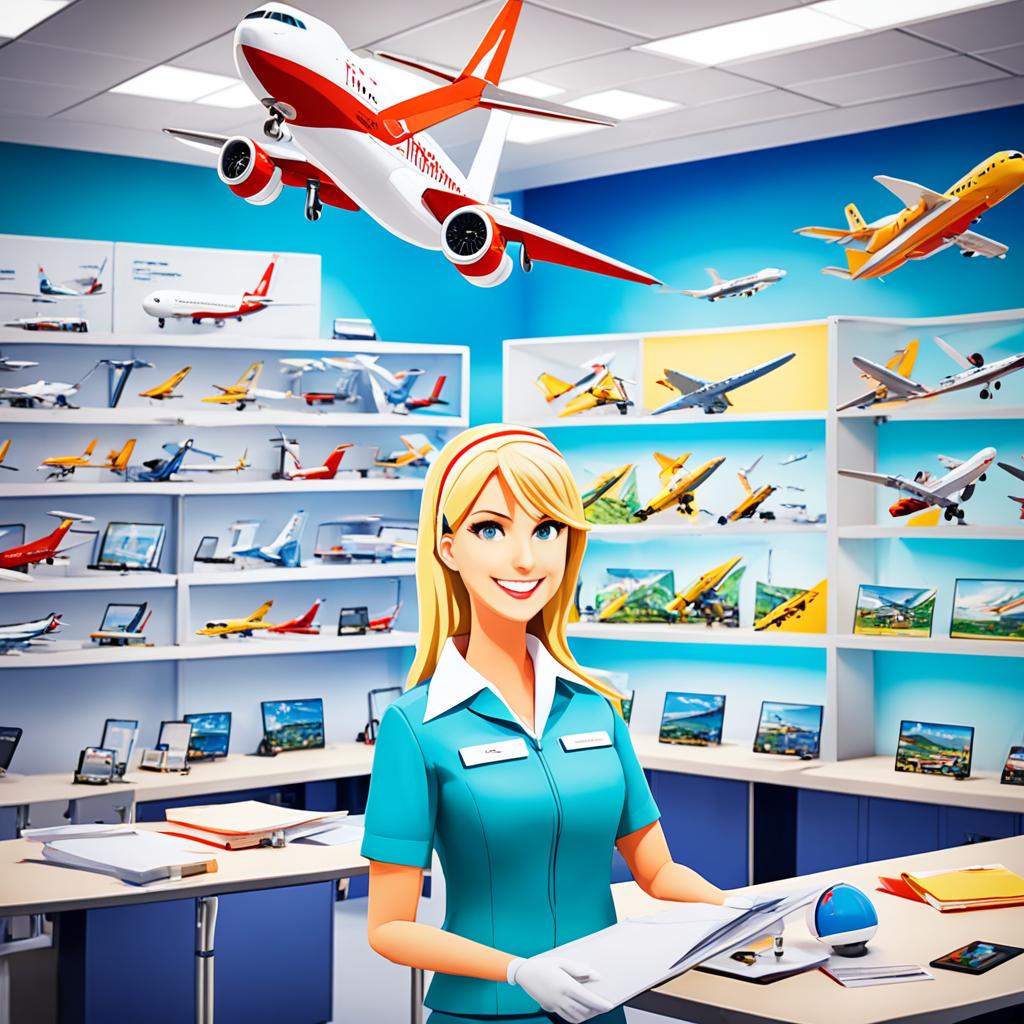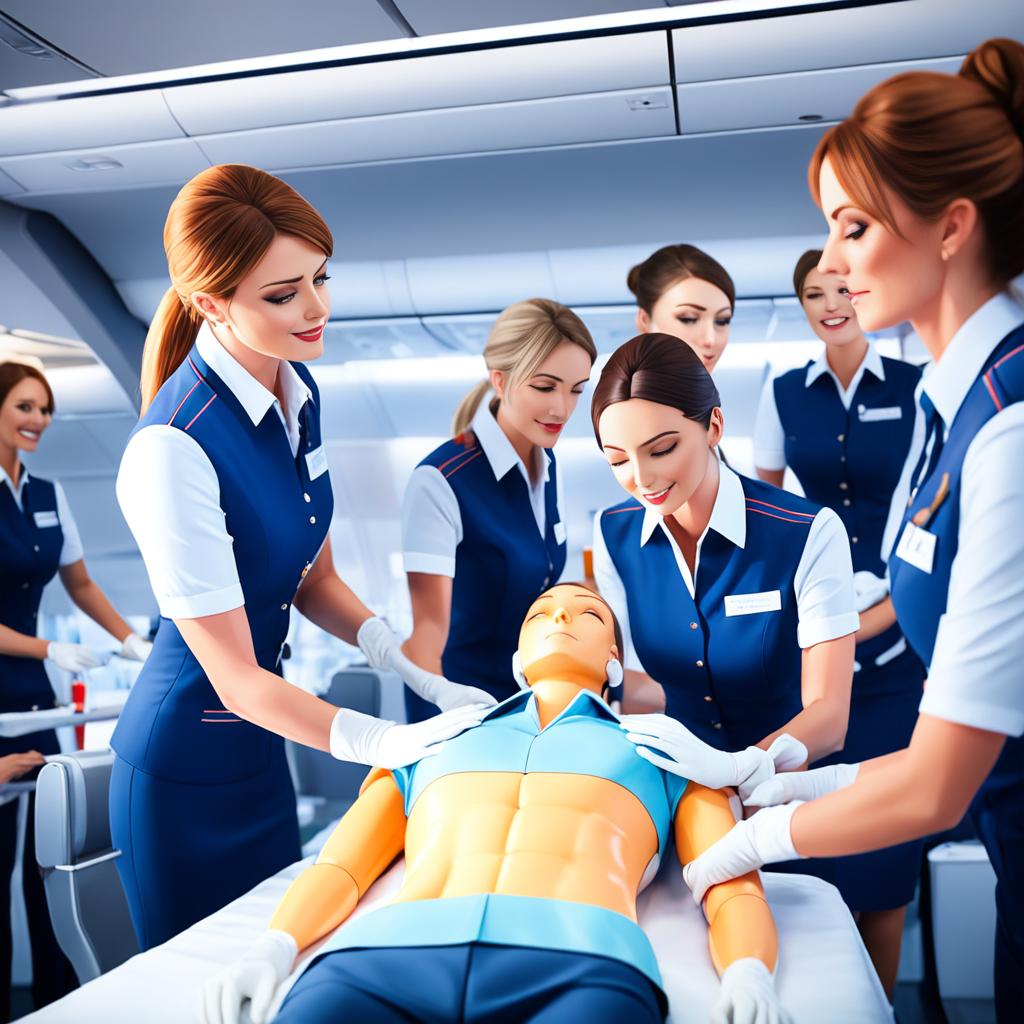Are you considering a career as a flight attendant? If so, you may be wondering what subjects you should study to best prepare for this exciting and dynamic profession.
Flight attendants play a crucial role in ensuring the safety and comfort of passengers during their journeys. While a high school education is typically the minimum requirement for this career, having a broader education can bring numerous benefits in dealing with the varied situations they may encounter on the job.
So, which subjects should you focus on to become a successful flight attendant? Let’s explore the educational path that can pave the way for a fulfilling career in this field.
Whether you are still in high school or considering postsecondary education, learning about the subjects and skills that are highly valued in the flight attendant profession can help you make informed decisions about your educational journey.
Postsecondary Training for Flight Attendants

Many airlines prefer to hire flight attendants with postsecondary training, making it advisable to complete a two-year or four-year college degree. While there is no specific major required for a career as a flight attendant, certain fields of study can be particularly beneficial. Degrees in hospitality, tourism, public relations, business, communications, psychology, sociology, nursing, anthropology, police or fire science, and education are all considered valuable in the industry.
Applicants with a college-level education are often given preference in employment, as it demonstrates a commitment to learning and a broader knowledge base. Additionally, having a college degree may open up opportunities for career advancement within the airline industry.
Airlines may also have their own training programs for flight attendants, which offer comprehensive instruction in various aspects of the job. These programs typically cover company operations, flight regulations, first aid, grooming, emergency procedures, customer service, and more.
| Recommended Fields of Study |
|---|
| Hospitality |
| Tourism |
| Public Relations |
| Business |
| Communications |
| Psychology |
| Sociology |
| Nursing |
| Anthropology |
| Police or Fire Science |
| Education |
Language Requirement for Flight Attendants

Flight attendants play a crucial role in ensuring a smooth and enjoyable travel experience for passengers. From assisting with boarding procedures to providing in-flight service, these professionals need to be adept at communication. One essential skill that flight attendants are often required to possess is the ability to converse in a foreign language, especially if they work for international airlines.
Being able to speak a foreign language opens up valuable opportunities for flight attendants to work on international flights and cater to diverse passengers from around the world. It allows for better communication, understanding, and the ability to provide exceptional customer service. Airlines recognize the importance of language skills and some even prefer candidates who are proficient in two major foreign languages.
Additionally, fluency in a foreign language can be a valuable asset when dealing with international passengers, as it helps create a more personalized and inclusive experience. Whether it’s assisting with special requests, offering directions, or simply engaging in conversation, speaking the passenger’s native language can make a significant difference.
Benefits of Language Proficiency for Flight Attendants
Being bilingual or multilingual offers numerous advantages for flight attendants:
- Improved Communication: The ability to speak a foreign language facilitates effective communication and eliminates language barriers between flight attendants and passengers.
- Cultural Sensitivity: Language proficiency reflects a deeper understanding and appreciation of different cultures, allowing flight attendants to connect with passengers on a more meaningful level.
- Enhanced Customer Service: Flight attendants who speak a passenger’s native language can provide personalized assistance, addressing concerns, and ensuring a comfortable travel experience.
- Emergency Situations: In emergency situations, clear and concise communication is vital. Knowing a foreign language can assist flight attendants in efficiently conveying important instructions and maintaining order.
Foreign Language Education and Training
If you aspire to become a flight attendant and wish to improve your foreign language skills, there are several ways to pursue language education:
- High School: Starting foreign language studies in high school is a great foundation. Take advantage of language courses offered by your school and consider studying beyond the minimum requirements.
- College: Pursuing a degree in a foreign language can significantly enhance your prospects as a flight attendant, especially if you aim to work for international airlines.
- Language Courses: Attend language courses at local institutions or online platforms to further develop proficiency in specific languages. Practice regularly to maintain fluency.
- Language Immersion Programs: Consider participating in language immersion programs or cultural exchange opportunities to enhance your language skills and gain a deeper understanding of the culture associated with the language.
| Benefits of Language Proficiency | Foreign Language Education and Training |
|---|---|
| Improved Communication | High School Language Studies |
| Cultural Sensitivity | College Degree in a Foreign Language |
| Enhanced Customer Service | Language Courses |
| Emergency Situations | Language Immersion Programs |
Other Education and Training for Flight Attendants

Flight attendants undergo comprehensive training to ensure they are prepared for the demands of their role. In addition to learning about company operations, flight regulations, grooming, and emergency procedures, flight attendants also receive training in CPR and first aid. This training equips them with the vital skills needed to handle medical emergencies and provide immediate assistance to passengers in need.
There are various avenues through which flight attendants can obtain CPR and first aid training. Many aspiring flight attendants choose to enroll in flight attendant training schools, where these courses are typically offered as part of the curriculum. Local community colleges and other educational providers also offer CPR and first aid training programs that are recognized and accepted by airlines.
Flight attendant training schools – These schools specialize in providing comprehensive training programs tailored specifically for aspiring flight attendants. As part of their curriculum, these schools offer CPR and first aid training to ensure flight attendants are certified in these critical skills. Examples of well-known flight attendant training schools include:
- FlightSafety International
- Flight Attendant Training School
- JetBlue University
- Pan Am International Flight Academy
Training provided by these schools is designed to meet industry standards and regulatory requirements, equipping flight attendants with the knowledge and confidence to handle emergency situations. Additionally, airlines with their own training programs ensure that their flight attendants receive the necessary CPR and first aid training as part of their overall preparation.
Furthermore, flight attendants are required to undergo additional training in emergency and passenger procedures on an ongoing basis. This helps them maintain and enhance their skills, keeping them up-to-date with the latest industry practices and regulations.
In addition to training, flight attendants must undergo a thorough background check, medical examination, and drug screening to ensure they meet the physical and mental requirements for the job. Airlines prioritize the safety and well-being of their passengers, which is why these checks are essential in the selection process.
Overall, the combination of CPR and first aid training, ongoing education, and rigorous background checks ensures that flight attendants are adequately equipped and prepared to handle any situation that may arise during their flights.
| Flight Attendant Training School | Location | Website |
|---|---|---|
| FlightSafety International | Multiple locations worldwide | flightsafety.com |
| Flight Attendant Training School | Houston, Texas | flightattendanttrainingschool.com |
| JetBlue University | Orlando, Florida | jetblue.com |
| Pan Am International Flight Academy | Miami, Florida | panamacademy.com |
Specific Airline Requirements for Flight Attendants
When it comes to pursuing a career as a flight attendant, it’s important to be aware that each airline may have unique requirements and qualifications for their candidates. These airline requirements can encompass various aspects, including physical attributes, education, language fluency, and more.
One of the common airline requirements for flight attendants is height. Airlines may have specific height restrictions to ensure that flight attendants can reach overhead compartments and perform other tasks comfortably. In addition to height, overall health is also essential, as flight attendants need to be physically fit to handle the demands of the job.
The five senses – hearing, sight, touch, smell, and taste – are also important factors in flight attendant qualifications. Airlines want to ensure that candidates have the sensory abilities necessary to perform their duties effectively. Furthermore, appearance standards play a role, as airlines often have specific grooming guidelines for their flight attendants.
Language fluency is another crucial requirement, particularly for those interested in working with international airlines. Airlines may prefer flight attendants who are proficient in multiple foreign languages, as this can enhance the level of customer service provided to passengers from different countries.
It is essential to understand that these airline requirements can vary from one company to another. Therefore, if you are considering a career as a flight attendant, it is vital to research and familiarize yourself with the specific requirements of the airlines you are interested in working for. By doing so, you can ensure that you meet the qualifications and increase your chances of success in this exciting profession.
FAQ
Q: What subjects do you need to become a flight attendant?
A: Useful subjects to study in high school include foreign languages, health, psychology, speech, business, sociology, geography, and first aid and emergency medical techniques. Pursuing a degree in fields such as hospitality, tourism, public relations, business, communications, psychology, sociology, nursing, anthropology, police or fire science, and education can also be beneficial.
Q: What postsecondary training is recommended for flight attendants?
A: While there is no specific major that will prepare you for a career as a flight attendant, degrees in hospitality, tourism, public relations, business, communications, psychology, sociology, nursing, anthropology, police or fire science, and education are all considered beneficial. Many airlines prefer to hire flight attendants with some college experience, so it is advisable to complete a two-year or four-year college degree. Additionally, airlines may have their own training programs for flight attendants.
Q: Is there a language requirement for flight attendants?
A: Flight attendants are often required to be able to converse in a foreign language, especially if they work for international airlines. Beginning foreign language studies in high school or obtaining a degree in a foreign language can open up opportunities for working on international flights. Some airlines even prefer candidates who are proficient in two major foreign languages.
Q: What other education and training do flight attendants need?
A: Flight attendants are often required to learn CPR and first aid. This training can be taken through flight attendant training schools, local community colleges, or other education providers. Most large airline companies have their own training schools for flight attendants, where trainees receive instruction on company operations, flight regulations, grooming, emergency procedures, and more. Flight attendants also undergo additional training in emergency and passenger procedures each year. Additionally, flight attendants must undergo a medical examination, background check, and drug screening.
Q: What are the specific requirements for flight attendants set by each airline?
A: Each airline may have its own set of guidelines and preferences when it comes to hiring flight attendants. These can include height requirements, overall health, five senses (hearing, sight, touch, smell, taste), appearance standards, language fluency, age restrictions, education requirements, citizenship and background checks, and relocation considerations. It is recommended to research the specific requirements of the airlines you are interested in working for.
